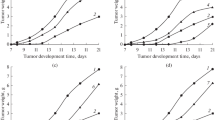Summary
Aclarubicin is an anthracycline antibiotic that differs from doxorubicin in its structure, mechanism of action, and preclinical toxicity profile, especially its reduced cardiotoxicity. We therefore conducted a side-by-side in vivo and in vitro trial of this agent in metastatic breast-cancer patients and their biopsied tumor specimens, respectively. Aclarubicin (100 mg/m2) was given by intravenous infusion every 3 weeks to 22 patients with objectively measurable metastatic breast cancer, 15 of whom had not previously received doxorubicin. The dose-limiting toxicity consisted primarily of leukopenia and severe nausea and vomiting. No objective response was observed in the 19 evaluable patients. After disease progression, 10 of the 15 doxorubicin-naive patients were treated with doxorubicin; 6 patients achieved a partial response, including 4 who responded to doxorubicin alone and 2 who responded to doxorubicin in combination with thiotepa and vinblastine. Tumor specimens were obtained from 14 of the 22 patients prior to the start of therapy and were tested for in vitro sensitivity to aclarubicin and doxorubicin using a soft agar colony-forming assay. Adequate colony growth occurred in 9 of 14 cultured tumor specimens. All 9 specimens, including 3 obtained from doxorubicin-naive patients, demonstrated in vitro resistance to aclarubicin. In all, 1 of 3 specimens taken from doxorubicin-naive patients demonstrated in vitro sensitivity to doxorubicin, whereas 6 tumor specimens obtained from patients who had undergone prior doxorubicin therapy demonstrated in vitro resistance. The patient whose tumor demonstrated in vitro doxorubicin sensitivity responded to a doxorubicin regimen after failing aclarubicin treatment; in vitro doxorubicin resistance correlated with clinical resistance in all cases. We conclude that aclarubicin is inactive in metastatic breast cancer at the dose and schedule used. Side-by-side in vivo and in vitro trials are feasible and could be useful in the development of investigational agents with activity greater than that of aclarubicin and, particularly, in the evaluation of analogs of clinically active drugs.
Similar content being viewed by others
References
Alberts DS, Salmon SE, Chen HSG, Moon TE, Young L, Surwit EA (1981) Pharmacologic studies of anticancer drugs with the human tumor stem cell assay. Cancer Chemother Pharmacol 6:253
Clinical brochure (July 1979) Aclacinomycin A (NSC-208734). Investigational Drug Branch, Cancer Therapy Evaluation Program, Division of Cancer Treatment, National Cancer Institute, Bethesda, Maryland
Danchev D, Slioussartchouk V, Paintrand M, Hayat M, Bourut C, Mathe G (1979) Electron microscopic studies of the heart and light microscopic studies of the skin after treatment of golden hamsters with Adriamycin, detouribicin, AD 32, and aclacinomycin. Cancer Treat Rep 63:931
Dorr RT, Bozak KA, Shipp NG, Hendrix M, Alberts DS, Ahman F (1988) In vitro rat myocyte cardiotoxicity model for antitumor antibiotics using adenosine triphosphate/protein ratios. Cancer Res 48:5222
Forastiere AA, Budman DR, Richards F, Aisner J, Weinberg V, Wood WC (1985) Phase II trial of aclacinomycin in advanced breast cancer: a Cancer and Leukemia Group B study. Cancer Treat Rep 67:1137
Gockerman JP, Raney M, Logan T (1985) Phase II evaluation of aclacinomycin in advanced breast cancer: a Southeastern Cancer Study Group trial. Cancer Treat Rep 69:1029
Hayward JL, Carbone PP, Heuson JC, Kamaoka S, Segaloff A, Rubens RD (1977) Assessment of response to therapy in advanced breast cancer. Cancer 39: 1289
Ogawa M, Inagki J, Horikoski, Inoue E, Chinen T, Ueoka H, Nagura E (1979) Clinical study of aclacinomycin-A. Cancer Treat Rep 63:931
Salmon SE, Liu RM, Casazza AM (1981) Evaluation of new anthracycline analogs with the human tumor stem cell assay. Cancer Chemother Pharmacol 6:103
Salmon SE, Liu R, Hayes C, Persaud J, Roberts R (1983) Usefulness of abrin as a positive control for the human tumor clonogenic assay. Invest New Drugs 1:277–281
VonHoff DD, Casper J, Bradley E, Sandbach J, Jones D, Makuch R (1981) Association between human tumor colony-forming assay results and response of an individual patient's tumor to chemotherapy. Am J Med 70:1027
Wadler S, Fuks JZ, Wiernik PH (1986) Phase I and II agents in cancer therapy: 1. Anthracyclines and related compounds. J Clin Pharmacol 26:491
Author information
Authors and Affiliations
Rights and permissions
About this article
Cite this article
Natale, R.B., Cody, R.L., Simon, M.S. et al. An in vivo and in vitro trial of aclarubicin in metastatic breast cancer: a novel approach to the study of analogs. Cancer Chemother. Pharmacol. 31, 485–488 (1993). https://doi.org/10.1007/BF00685040
Received:
Accepted:
Issue Date:
DOI: https://doi.org/10.1007/BF00685040




